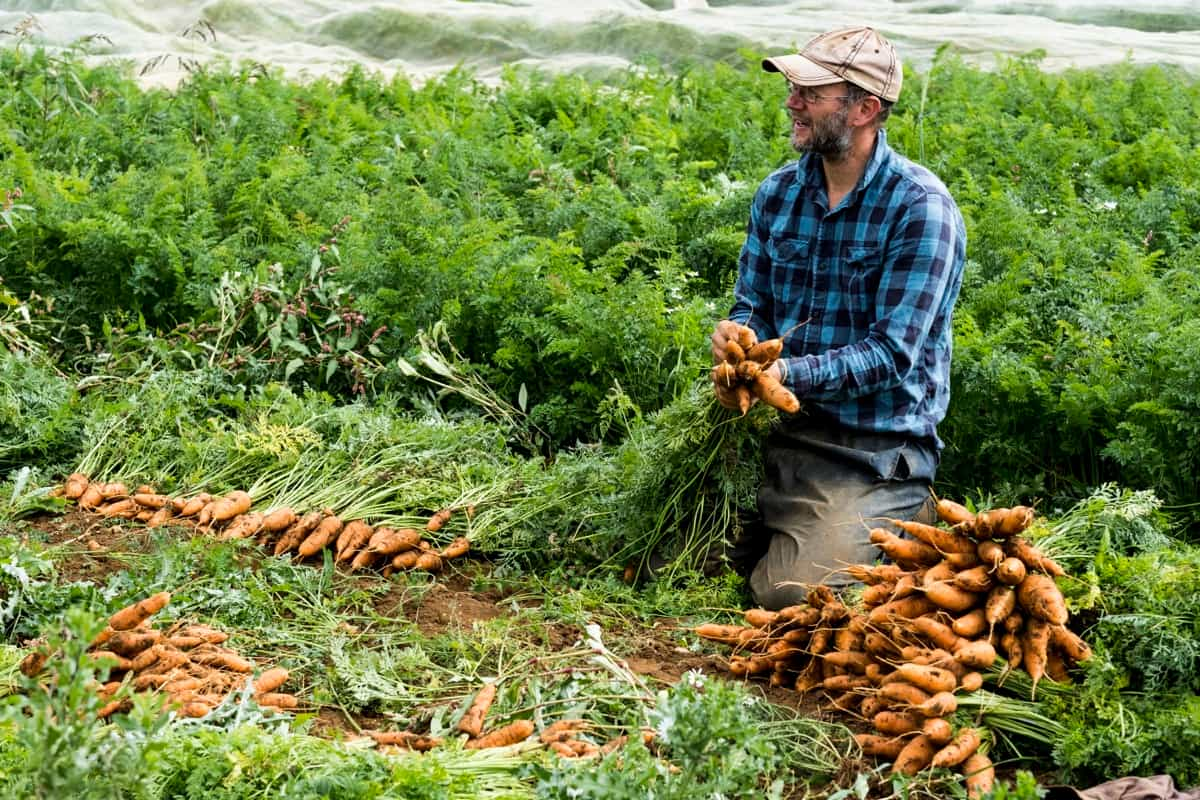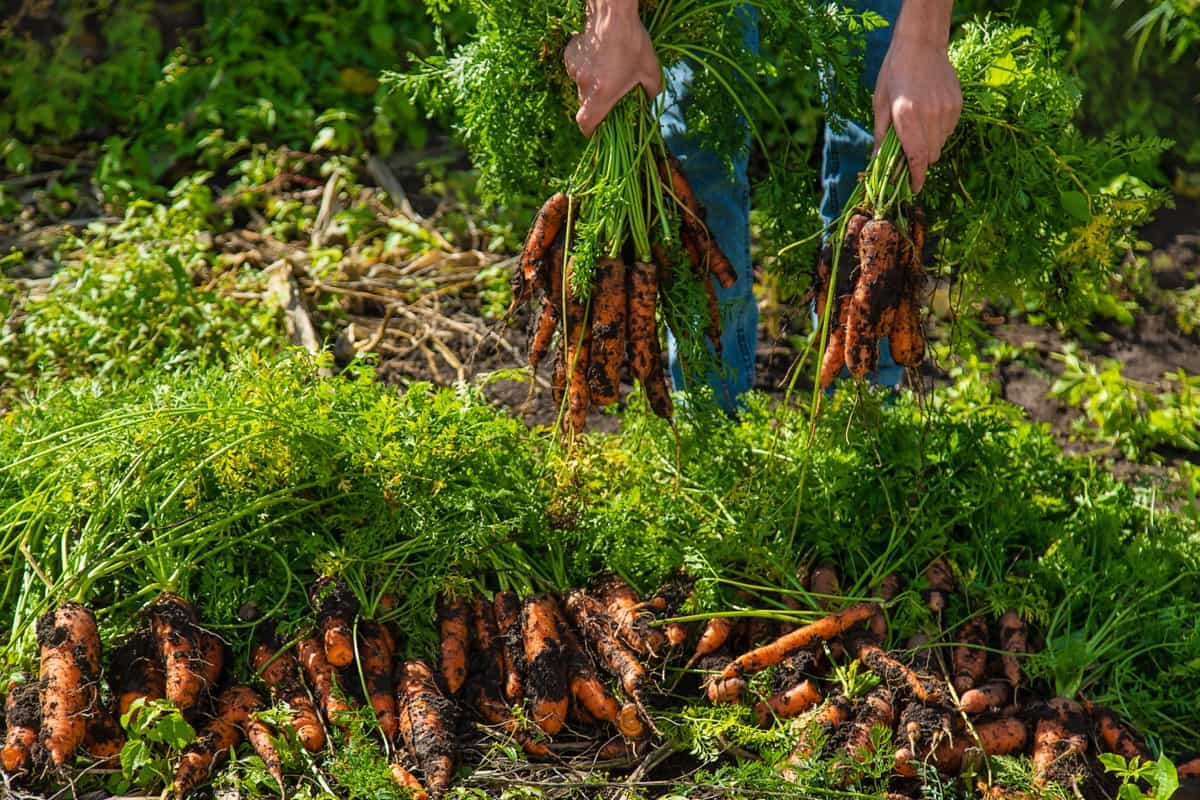Carrots, scientifically known as Daucus carota, are versatile biennial vegetable plants that belong to the Apiaceae family. Organic Carrot farming is a sustainable agricultural practice that cultivates Carrots without the use of synthetic chemicals or pesticides. It involves working in harmony with nature to produce healthy and nutritious crops while preserving the environment for future generations.

Benefits of Growing Carrots Organically
Growing Carrots organically offers a myriad of benefits for both the environment and your health. By opting for organic methods, you contribute to sustainable farming practices that promote biodiversity. Organic Carrot farming avoids the use of synthetic pesticides and fertilizers, reducing chemical runoff into water sources. Organically grown Carrots are richer in nutrients and flavor compared to conventionally grown ones due to the absence of artificial additives.
This results in tastier dishes and healthier meals for you and your family. Additionally, organic farming promotes better animal welfare practices as it minimizes exposure to harmful chemicals that can impact wildlife habitats. Moreover, consuming organic produce reduces exposure to harmful chemicals found in conventional agriculture, leading to better overall health for consumers.
Choosing the Right Carrot Varieties for Organic Farming
Some popular Carrot varieties for organic farming include Napoli, Scarlet Nantes, Cosmic Purple, and Atomic Red. Other popular organic Carrot varieties include ‘Bolero,’ known for its sweet flavor and uniform shape, ‘Scarlet Nantes,’ which is great for both fresh eating and processing; and ‘Atomic Red,’ with its vibrant red color that adds a pop to any dish.
When selecting your Carrot varieties, consider factors such as soil type, climate conditions, and intended use. Whether you prefer short or long Carrots, heirloom or hybrid options, there’s a variety out there to suit your needs.
Soil Health and Preparation for Organic Carrots
Before planting, it’s essential to ensure that the soil is rich in nutrients and well-drained. Carrots thrive in loose, well-aerated soil with a pH level between 6.0 and 7.0. To prepare the soil, start by eliminating weeds and debris. Incorporate organic matter to improve fertility and structure. This will provide the Carrots with the necessary nutrients for healthy growth. Avoid using synthetic pesticides, as they can harm beneficial microorganisms in the soil.
In case you missed it: How to Start Dragon Carrot Farming: A Step-by-Step Growing Guide

Instead, focus on natural alternatives such as bone meal or fish emulsion to nourish your crops organically. Regularly testing the soil for nutrient levels can help you adjust your fertilization plan accordingly. Healthy soil leads to healthy Carrot plants, so investing time in preparing your soil adequately will pay off in bountiful harvests of flavorful organic Carrots.
Before planting, remove any weeds and work the soil using a garden fork or tiller. This will help break up clumps and improve drainage so that your Carrots’ roots can grow deeply. Consider adding aged manure to enrich the soil with essential nutrients. Choose natural alternatives like organic compost or mulch to nourish your Carrot crop naturally.
Organic Seed Selection and Treatment
Selecting the right organic seeds is crucial for a successful Carrot farming venture. Choose Carrot varieties that are suited to your soil conditions and climate. Look for reputable seed suppliers who offer organic and non-GMO options to ensure the quality of your crop. Treating organic seeds before planting can help improve germination rates and overall plant health.
Consider using natural methods such as soaking seeds in compost tea or seaweed extract to boost their vitality. Avoid using chemical treatments on your organic seeds, as this goes against the principles of organic farming. Instead, focus on enhancing seed vigor through natural means like proper hydration and temperature control during storage.
Planting Strategies for Organic Carrots
Ensure you choose a sunny spot with well-draining soil for optimal growth. Carrots thrive in loose, friable soil that allows them to develop long, straight roots. Before planting your Carrot seeds, make sure the soil is free of rocks and debris that could hinder their growth. When sowing Carrot seeds, aim for a depth of around half an inch and space them out accordingly to avoid overcrowding. Thin seedlings as they grow to prevent competition for nutrients and promote healthy root development.
Watering is crucial during the germination period to keep the soil moist but not waterlogged. Regular watering is essential for healthy Carrot growth, especially during dry periods. Mulching around Carrot plants can help retain moisture in the soil and suppress weeds. Watch for pests like Carrot rust flies and practice crop rotation to prevent diseases from taking hold in your garden.
Water Management in Organic Carrot Farming
Carrots require consistent moisture, especially during germination and root development. Proper irrigation techniques such as drip or soaker hoses can help deliver water to the roots without wasting resources. Monitoring soil moisture levels regularly is essential to avoid under and overwatering, which can lead to issues like rotting or stunted growth. Mulching around Carrot plants helps retain soil moisture, reduces evaporation, and suppresses weed growth.
In case you missed it: Growing Carrots Organically in Punjab: Cultivation Practices and Production Management

Consider implementing rainwater harvesting systems or utilizing sustainable water sources to reduce reliance on traditional irrigation methods. By efficiently managing water in your organic Carrot farm, you not only promote healthy plant growth but also contribute to environmental sustainability.
Organic Fertilization Techniques
Organic fertilizers like compost, manure, fish emulsion, and bone meal are excellent choices for enriching the soil with essential nutrients naturally. Compost is a fantastic option that provides nutrients and also improves soil structure and water retention—it’s like giving your Carrots a nutrient-packed meal.
Animal manure from animals like cows or chickens is another great organic fertilizer option. Rich in nitrogen, phosphorus, and potassium, it helps promote overall plant health. A bone meal is perfect for supplementing calcium and phosphorus levels in the soil – important minerals for developing sturdy Carrot roots.
Natural Weed Control Methods
The effective method is mulching with organic materials like straw or grass clippings. This helps suppress weed growth while also retaining moisture in the soil. Another natural weed control technique is hand weeding. Though labor-intensive, removing weeds by hand ensures that they are eliminated without the use of chemicals. It’s a great way to keep your Carrot crop healthy and thriving.
Crop rotation can also help control weeds organically. By planting different crops in succession, you disrupt weed growth cycles and reduce their prevalence in the soil. Utilizing cover crops such as clover or buckwheat can smother out weeds and improve soil health simultaneously. These companion plants not only suppress unwanted vegetation but also attract beneficial insects to your farm.
Organic Pest Management
Some common pests that can affect Carrot crops include aphids, cutworms, and Carrot rust flies. If not properly controlled, these pesky intruders can damage the leaves, roots, and overall health of your plants. The effective method for managing pests organically is to introduce beneficial insects that prey on harmful pests without the need for harsh chemicals.
Additionally, practicing crop rotation and intercropping can help disrupt pest cycles and reduce their impact on Carrots. For more stubborn infestations, consider using natural remedies such as neem oil spray or garlic pepper tea to deter pests from your crops. Regular monitoring of your Carrot plants is key to catching any pest issues early on before they escalate into larger problems.
Disease Prevention in Organic Carrot Cultivation
Carrots are susceptible to various diseases that can affect their growth and overall yield. The main disease is powdery mildew, which manifests as a white powdery substance on the leaves. To combat this, proper ventilation and spacing between plants are essential.
In case you missed it: Fertilizer Management in Carrot Farming: Organic, NPK, How and When to Apply

Another issue to watch out for is bacterial soft rot, which causes decay in the Carrots’ roots. Ensuring good drainage in the soil can help prevent this disease from taking hold. Additionally, leaf blight can be a concern, leading to yellowing and wilting of the foliage. Regularly inspecting your crop for any signs of disease and promptly addressing them is crucial for maintaining healthy plants.
Monitoring and Maintaining Crop Health
Regularly inspect your Carrot plants for any signs of nutrient deficiencies, pests, or diseases. Watch for yellowing leaves, stunted growth, or unusual spots on the foliage. Utilize organic pest management techniques to control common pests like aphids, nematodes, and Carrot rust flies. Consider companion planting with beneficial insect-attracting flowers to deter harmful bugs naturally.
Implement crop rotation practices to prevent soil-borne diseases and maintain soil fertility levels. Rotate your Carrot crops with other vegetables, such as legumes or leafy greens, to break disease cycles and replenish nutrients in the soil. Regularly test your soil pH levels and adjust as needed to ensure optimal growing conditions for your Carrots. Proper pH levels help maximize nutrient uptake by the plants and promote healthy root development.
Harvesting Organic Carrots
Carrots are best to harvest when they reach the desired size, typically around 1 inch in diameter. Carefully loosen the soil around the Carrot tops before pulling them out to avoid breaking the roots. To harvest, grasp the green tops and pull upwards with a steady motion. Be careful not to damage or bruise the Carrots during this process.
In case you missed it: How to Start Carrot Farming in the USA: A Step-By-Step Production Guide for Planting to Harvesting

Remove excess soil clinging to the roots, but avoid washing them immediately, as dampness can lead to decay. Once harvested, trim off the foliage about an inch above the root and discard any damaged or misshapen Carrots. Store your freshly picked organic Carrots in a cool, dark place with high humidity levels to maintain their crispness and flavor.
Post-Harvest Handling and Storage Solutions
After months of hard work and dedication to cultivate your organic Carrots, it’s crucial to handle the post-harvest stage with care. Proper handling and storage solutions can ensure that your harvest stays fresh and retains its nutritional value for longer periods. Once harvested, gently brush off excess soil from the Carrots before storing them. Avoid washing Carrots, as moisture can lead to rotting during storage. ‘
Trim any damaged or wilted greens, but leave about an inch of the green tops intact to help retain moisture. For short-term storage, place unwashed Carrots in a plastic bag in the refrigerator’s crisper drawer. The perforations allow for airflow while preventing excessive moisture buildup. Carrots stored this way can stay fresh for up to a few weeks.
If you have a larger harvest intended for long-term storage, consider options like root cellars or sand pits, where temperature and humidity levels are naturally controlled. These methods can keep your organic Carrots crisp and flavorful throughout the winter months.
Marketing and Selling Organic Carrots
When it comes to marketing and selling organic Carrots, there are several avenues you can explore to reach your customers. One option is to sell directly at farmers’ markets or through a CSA (Community Supported Agriculture) program. This allows you to connect with consumers who value locally grown, organic produce. Another strategy is to partner with local restaurants and grocery stores that prioritize sourcing from sustainable farms. Building relationships with these businesses can help increase the visibility of your organic Carrots in the community.
Online platforms also offer opportunities for selling organic Carrots. Setting up an e-commerce website or utilizing social media channels can attract a wider audience beyond your local area. Don’t forget about the word-of-mouth marketing. Encourage customers to talk the word about your delicious, organic Carrots to their friends and family members.
Future Trends in Organic Carrot Farming
One emerging trend is the use of technology to monitor soil health and optimize water usage, leading to more sustainable practices. Additionally, there is a growing interest in regenerative agriculture techniques that focus on improving soil fertility and biodiversity. This approach not only benefits Carrot crops but also contributes to overall ecosystem health.
In case you missed it: Ginger Farming Business Plan: A Guide to Production and Cultivation for Beginners

Another trend shaping the future of organic Carrot farming is consumer education and transparency. More consumers are seeking information about where their food comes from and how it is grown, driving farmers to adopt even higher standards of sustainability. Furthermore, with advancements in breeding programs, we can expect to see new varieties of Carrots developed specifically for organic cultivation.
These varieties may offer improved disease resistance or enhanced flavor profiles, catering to evolving consumer preferences. Organic Carrot farming offers a sustainable and rewarding way to cultivate this nutritious root vegetable. By following organic practices, farmers can produce high-quality Carrots while also promoting environmental health and biodiversity.
- Types of Pesticides Used in Agriculture: A Beginner’s Guide
- Economical Aquaculture: A Guide to Low-Budget Fish Farming
- 15 Common Planting Errors That Can Doom Your Fruit Trees
- How to Make Houseplants Bushy: Effective Tips and Ideas
- Innovative Strategies for Boosting Coconut Pollination and Yield
- Pollination Strategies for Maximum Pumpkin Yield
- The Complete Guide to Chicken Fattening: Strategies for Maximum Growth
- Natural Solutions for Tulip Problems: 100% Effective Remedies for Leaf and Bulb-Related Issues
- Revolutionizing Citrus Preservation: Towards a Healthier, Greener Future
- Natural Solutions for Peony Leaf and Flower Problems: 100% Effective Remedies
- Maximizing Profits with Avocado Contract Farming in India: A Comprehensive Guide
- Natural Solutions for Hydrangea Problems: 100% Effective Remedies for Leaf and Flowers
- The Ultimate Guide to Choosing the Perfect Foliage Friend: Bringing Life Indoors
- From Sunlight to Sustainability: 15 Ways to Use Solar Technology in Agriculture
- The Ultimate Guide to Dong Tao Chicken: Exploring from History to Raising
- The Eco-Friendly Makeover: How to Convert Your Unused Swimming Pool into a Fish Pond
- Mastering the Art of Delaware Chicken Farming: Essentials for Healthy Backyard Flocks
- 20 Best Homemade Fertilizers for Money Plant: DIY Recipes and Application Methods
- How to Craft a Comprehensive Free-Range Chicken Farming Business Plan
- Brighten Your Flock: Raising Easter Egger Chickens for Beauty and Bounty
- How to Optimize Your Poultry Egg Farm Business Plan with These Strategies
- Subsidy for Spirulina Cultivation: How Indian Government Schemes Encouraging Spirulina Farmers
- Ultimate Guide to Raising Dominique Chickens: Breeding, Feeding, Egg-Production, and Care
- Mastering the Art of Raising Jersey Giant Chickens: Care, Feeding, and More
- Ultimate Guide to Raising Legbar Chickens: Breeding, Farming Practices, Diet, Egg-Production
- How to Raise Welsummer Chickens: A Comprehensive Guide for Beginners
- How to Protect Indoor Plants in Winter: A Comprehensive Guide
- Ultimate Guide to Grow Bag Gardening: Tips, Tricks, and Planting Ideas for Urban Gardeners
- Guide to Lotus Cultivation: How to Propagate, Plant, Grow, Care, Cost, and Profit
- Agriculture Drone Subsidy Scheme: Government Kisan Subsidy, License, and How to Apply Online
- Ultimate Guide to Raising Araucana Chickens: Breed Profile, Farming Economics, Diet, and Care
- Bringing Hydroponics to Classroom: Importance, Benefits of Learning for School Students
- Ultimate Guide to Raising Polish Chickens: Breed Profile, Farming Economics, Diet, and Care
- Ultimate Guide to Raising Australorp Chickens: Profile, Farming Economics, Egg Production, Diet, and Care
- Silkie Chicken Farming: Raising Practices, Varieties, Egg Production, Diet, and Care
- Sussex Chicken Farming: Raising Practices, Varieties, Egg Production, Diet and Care